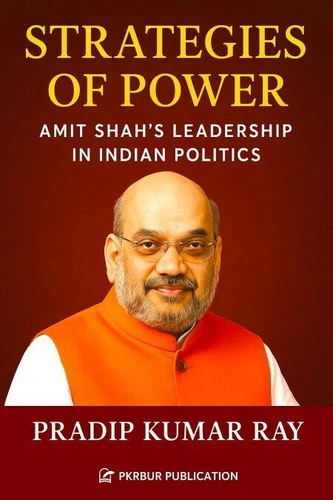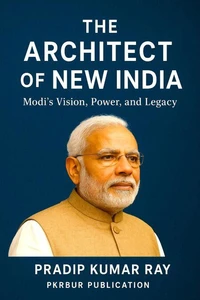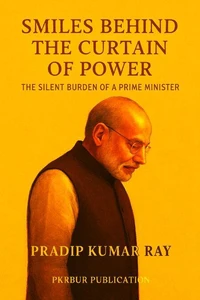Nouveauté
Strategies of Power (Amit Shah's Leadership in Indian Politics)
Par :Formats :
Disponible dans votre compte client Decitre ou Furet du Nord dès validation de votre commande. Le format ePub est :
- Compatible avec une lecture sur My Vivlio (smartphone, tablette, ordinateur)
- Compatible avec une lecture sur liseuses Vivlio
- Pour les liseuses autres que Vivlio, vous devez utiliser le logiciel Adobe Digital Edition. Non compatible avec la lecture sur les liseuses Kindle, Remarkable et Sony
 , qui est-ce ?
, qui est-ce ?Notre partenaire de plateforme de lecture numérique où vous retrouverez l'ensemble de vos ebooks gratuitement
Pour en savoir plus sur nos ebooks, consultez notre aide en ligne ici
- FormatePub
- ISBN8232398613
- EAN9798232398613
- Date de parution29/09/2025
- Protection num.pas de protection
- Infos supplémentairesepub
- ÉditeurHamza elmir
Résumé
The landscape of Indian politics is constantly evolving, shaped by a blend of history, ideology, and the dynamic aspirations of its people. Among the many figures that have influenced this transformation, Amit Shah stands out as a leader whose strategies have not only propelled his party to unprecedented heights but also redefined how politics is practiced in the world's largest democracy. This book, Strategic Power: Amit Shah's Leadership in Indian Politics, is an attempt to examine the rise of a political strategist who has been instrumental in reshaping the Bharatiya Janata Party (BJP) and the broader narrative of governance in India.
It delves into the mechanisms of power-how campaigns are planned, how policies are framed, and how a vision for the future is translated into political action. The chapters are structured to cover multiple dimensions: Shah's early life and ideological influences, His role as a strategist and administrator, His contributions to national security, governance, and digital transformation, And finally, his vision for India's political future.
This is not a hagiography, nor is it a critique for the sake of criticism. Instead, it is an analytical exploration that seeks to understand the methods, decisions, and philosophies that have shaped one of the most powerful political figures in contemporary India. As India approaches a new phase of its journey-marked by rapid globalization, technological change, and internal challenges-it becomes essential to understand the leaders who steer its course.
Through this book, I hope to provide readers with a deeper understanding of Amit Shah's role, strategies, and the implications of his leadership for the future of Indian politics. I invite readers to engage with this work with an open mind, to reflect on the narratives presented, and to draw their own conclusions about the evolving nature of power and governance in our democracy.
It delves into the mechanisms of power-how campaigns are planned, how policies are framed, and how a vision for the future is translated into political action. The chapters are structured to cover multiple dimensions: Shah's early life and ideological influences, His role as a strategist and administrator, His contributions to national security, governance, and digital transformation, And finally, his vision for India's political future.
This is not a hagiography, nor is it a critique for the sake of criticism. Instead, it is an analytical exploration that seeks to understand the methods, decisions, and philosophies that have shaped one of the most powerful political figures in contemporary India. As India approaches a new phase of its journey-marked by rapid globalization, technological change, and internal challenges-it becomes essential to understand the leaders who steer its course.
Through this book, I hope to provide readers with a deeper understanding of Amit Shah's role, strategies, and the implications of his leadership for the future of Indian politics. I invite readers to engage with this work with an open mind, to reflect on the narratives presented, and to draw their own conclusions about the evolving nature of power and governance in our democracy.
The landscape of Indian politics is constantly evolving, shaped by a blend of history, ideology, and the dynamic aspirations of its people. Among the many figures that have influenced this transformation, Amit Shah stands out as a leader whose strategies have not only propelled his party to unprecedented heights but also redefined how politics is practiced in the world's largest democracy. This book, Strategic Power: Amit Shah's Leadership in Indian Politics, is an attempt to examine the rise of a political strategist who has been instrumental in reshaping the Bharatiya Janata Party (BJP) and the broader narrative of governance in India.
It delves into the mechanisms of power-how campaigns are planned, how policies are framed, and how a vision for the future is translated into political action. The chapters are structured to cover multiple dimensions: Shah's early life and ideological influences, His role as a strategist and administrator, His contributions to national security, governance, and digital transformation, And finally, his vision for India's political future.
This is not a hagiography, nor is it a critique for the sake of criticism. Instead, it is an analytical exploration that seeks to understand the methods, decisions, and philosophies that have shaped one of the most powerful political figures in contemporary India. As India approaches a new phase of its journey-marked by rapid globalization, technological change, and internal challenges-it becomes essential to understand the leaders who steer its course.
Through this book, I hope to provide readers with a deeper understanding of Amit Shah's role, strategies, and the implications of his leadership for the future of Indian politics. I invite readers to engage with this work with an open mind, to reflect on the narratives presented, and to draw their own conclusions about the evolving nature of power and governance in our democracy.
It delves into the mechanisms of power-how campaigns are planned, how policies are framed, and how a vision for the future is translated into political action. The chapters are structured to cover multiple dimensions: Shah's early life and ideological influences, His role as a strategist and administrator, His contributions to national security, governance, and digital transformation, And finally, his vision for India's political future.
This is not a hagiography, nor is it a critique for the sake of criticism. Instead, it is an analytical exploration that seeks to understand the methods, decisions, and philosophies that have shaped one of the most powerful political figures in contemporary India. As India approaches a new phase of its journey-marked by rapid globalization, technological change, and internal challenges-it becomes essential to understand the leaders who steer its course.
Through this book, I hope to provide readers with a deeper understanding of Amit Shah's role, strategies, and the implications of his leadership for the future of Indian politics. I invite readers to engage with this work with an open mind, to reflect on the narratives presented, and to draw their own conclusions about the evolving nature of power and governance in our democracy.




















